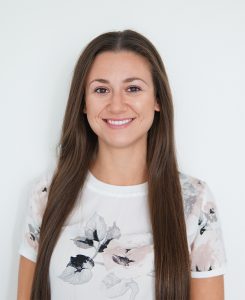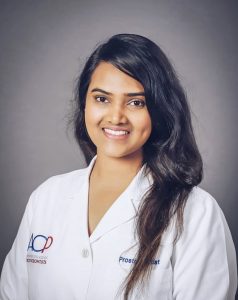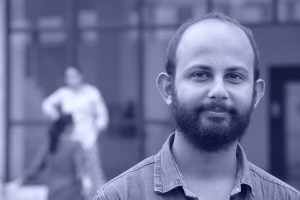Name: Dipon Saha
Program: PhD in Craniofacial Science
Research supervisor: Dr. Dieter Bromme
Hometown: Kolkata, India
Research topic:
I am working on characterizing a viral protease (3CL Mpro) of SARS COV 2. This enzyme plays a pivotal role in virus life cycle, specifically in the making of the next generation of viruses as well as in viral pathogenesis. My goal is to characterize this enzyme as well as to find potent inhibitors for this enzyme from a pool of natural compounds.
Why did you decide to pursue a graduate degree, and why did you choose to study at UBC's Faculty of Dentistry?
Through the graduate program I wished to utilize the opportunity to learn and ask questions like What, When, Where, Why, and How. Learning and the constant ambition of gaining knowledge is very addictive, which pushed me into this path in pursuit of knowing the unknown. UBC represents the perfect amalgamation of natural beauty and knowledge. I have heard stories from my professors who studied/worked at UBC. The stories have instated my wish to choose UBC and I feel fortunate enough to have been selected by UBC.
What aspects of your life/career before have best prepared you for your graduate program?
I was properly introduced to the realm of biology at the age of seventeen which conceptualized my initial interest in the subject. I obtained my Masters in Food Processing and Nutrition Science from the Indian Institute of Engineering Science and Technology, Shibpur. There I was instilled with contemporary interdisciplinary approaches to the understanding of biology and drug delivery. To further my interdisciplinary view, I joined an additional postgraduate course in Chemical and Molecular Biology offered by two pioneer research institutes of India: the Indian Institute of Technology, Kharagpur (IIT-KGP) and the Indian Association for the Cultivation of Science (IACS) in Kolkata. Rigorous trainings from these pioneering institutes of India have prepared me for this journey.
What aspect of your graduate program do you enjoy the most or are looking forward to with the most curiosity?
From my point of view, the most important aspect of a graduate program is "transformation." The person who is standing at the very beginning of this journey will completely change when they go through this journey. Their point of view towards life and towards addressing a problem will be changed completely. I am looking forward to seeing that transformation in myself. I am hoping that at the end of this journey, I will gain a new point of view to look at life.
How do you envision connecting your graduate/post-graduate work with broader career possibilities?
Often we forget to refocus our research interest into a broader perspective wherein we can reframe our qualifications and experience into a career. I envision not limiting myself to academia, although my primary interest will be to be a practising scientist. Nevertheless, I wish to utilize my experience in viral proteomic study in the Research and Development sector of various pharmaceutical firms.
What advice do you have for new graduate students?
A human being is incomplete without their failures. Life hits you hard and teaches you lessons, so if you face failure, embrace it and put in the effort to analyze your failure. Victory will be yours, maybe not today or tomorrow, but it will be yours. And most importantly, do not forget to take a break from time to time.

Name: Jessica Kehler
Program: MSc/Diploma in Orthodontics
Research supervisors: Dr. Jolanta Aleksejuniene
Hometown: Winnipeg, Manitoba
Research topic:
This past year COVID-19 has hit everywhere worldwide, and dental education was not immune to its effects. My research is focused on how COVID-19 affected graduate orthodontic education, and more specifically the competencies required for graduation.
Why did you decide to pursue a graduate degree, and why did you choose to study at UBC's Faculty of Dentistry?
Ever since I started my own orthodontic journey at 9 years old, I knew I wanted to be an orthodontist one day. I felt that the results I obtained from treatment were life-changing in terms of self-esteem and I wanted to be able to help others in the same way. I chose UBC for my graduate training because it is highly-ranked among universities internationally and I knew I would get a great education here (the location itself is also a plus!)
What aspects of your life/career before have best prepared you for your graduate program?
I have always been very independent, determined, and had a strong work ethic, primarily because I put myself on this career trajectory when I was a teenager. I knew from an early age that I wanted to be an orthodontist, and that this was a competitive program to get into. Everything I have been through to this point has prepared me for this graduate program.
What aspect of your graduate program do you enjoy the most or are looking forward to with the most curiosity?
There are a couple things I really enjoy about this program. First and foremost, I started this program amid a pandemic which came with its own challenges. However, the other residents currently in the program did an amazing job at welcoming us and making the transition into graduate school a positive experience. Secondly, I also enjoy looking at the progress of my patients and having them express their happiness/satisfaction as well!
How do you envision connecting your graduate/post-graduate work with broader career possibilities?
Graduate school is a great place to network. We are exposed to so many remarkable faculty members in all disciplines, not just your own graduate program. This allows you to build broad connections with instructors, professors, and researchers. Clinically, we also have a large instructor base with people who have their private practices all over BC, not just in Vancouver! This gives you a different perspective of orthodontic care outside of UBC.
What advice do you have for new graduate students?
The shift to graduate education can be difficult, often because it is vastly different from undergraduate programs. It is much more independent and requires self-study in many aspects. As such, time management and discipline are crucial especially if you are juggling didactic education, clinical duties, and your master's thesis. Just remember that everyone is going through the same thing, and your other co-residents are there if you need them! I have made a lot of great friendships in this program and am incredibly happy that I chose to continue my education at UBC.

Name: Bernardo U. Peres
Program: PhD/Diploma in Orthodontics
Research supervisors: Dr. Najib T. Ayas and Dr. Fernanda Almeida
Hometown: Santa Maria, Brazil
Research topic:
My research topic is related to the epidemiology of sleep disorder breathing, orthodontics, and methods to improve patient care and the long-term consequences of disease. The idea is to integrate research and clinical care to improve our understanding of these conditions and to impact society in a positive and meaningful way.
Why did you decide to pursue a graduate degree, and why did you choose to study at UBC's Faculty of Dentistry?
My parents are both professors in Brazil, so I guess it never crossed my mind not to go to grad school. At the same time, a mix of curiosity and a passion for gaining deeper knowledge guided me all the way here. UBC Dentistry was a funny coincidence. I was exposed to it when I received a scholarship during my last year of dental school. After coming here, I decided that if I were to go to grad school, this would be the place.
What aspects of your life/career before have best prepared you for your graduate program?
The influence of my family, and the constant desire to be a better professional.
What aspect of your graduate program do you enjoy the most or are looking forward to with the most curiosity?
It's really nice to be able to critically appraise the knowledge that is being built around my specialty and to apply it to every patient we see in the clinic. This sense of having a good understanding of the whole picture was something I looked forward to for a long time and it's nice to start seeing it.
How do you envision connecting your graduate/post-graduate work with broader career possibilities?
My vision of the future is quite open. I believe a joint clinical and research degree allows you to explore many possibilities, and I'm looking forward to exploring all of them.
What advice do you have for new graduate students?
"Lower expectations, higher rewards." Keep your own expectations within a healthy range, don't be too harsh on yourself, and take care of yourself during all these extra years of school. It's not easy, but you can find a lot of joy throughout the journey.

Name: Visalakshi Shivaraman
Program: MSc/Diploma in Prosthodontics
Research supervisors: Dr. Vincent Lee
Hometown: Mumbai, India
Research topic:
My research involves testing different 3D printers to statistically evaluate their efficacy in reproducing resin models and prostheses of the most common anatomical angles of the human facial bones, namely the mandible, maxillary complex, and cranial bones, in different races and genders. This is to help us identify which printer would be the best fit in different surgical and prosthetic rehabilitation and reconstruction scenarios which necessitate custom-made solutions for patients.
Why did you decide to pursue a graduate degree, and why did you choose to study at UBC's Faculty of Dentistry?
I was inspired while pursuing dentistry primarily by complex prosthetic rehabilitation of patients to help them function and look better. Of particular interest was patients with oral cancer and the application of 3D printing to help them. Since providing care to them would require me to upgrade my skills and knowledge significantly, I decided to pursue the graduate program in Prosthodontics at UBC since it is one of the best public universities for dental research and education in the world. The program offers me a world-class 3D printing facility which will aid me in fulfilling my professional goals satisfactorily.
What aspects of your life/career before have best prepared you for your graduate program?
My work as the head of the National Oral Health Program at the Indian Dental Association in Mumbai for over a year gave me great experience in managing and executing different outreach programs. Together with the WHO, UICC, and Government of India, I spearheaded a nationwide oral cancer awareness campaign and tobacco cessation workshop with eminent oral surgeons. From treating Special Olympics athletes and victims of child trafficking to conducting free camps for complete dentures for geriatric patients, I gained the confidence to pursue bigger things. I also attribute my preparedness to 3D printing workshops I attended and an awareness study I conducted on the same topic during my last year at dental school.
What aspect of your graduate program do you enjoy the most or are looking forward to with the most curiosity?
I thoroughly enjoy brainstorming with experienced faculty members and colleagues from different specialties to achieve the best treatment outcomes for our patients. It is my aim to continuously push the envelope and embrace new ways of thinking and approaching a problem. Learning optimum use of Digital Dentistry and 3D printing, as well as my government-funded research, are the two things I look forward to the most.
How do you envision connecting your graduate/post-graduate work with broader career possibilities?
Prosthodontics as a specialty is very exciting and the digital revolution in dentistry adds a new dimension to it. I hope my graduate work and research will aid in serving the community by providing better access to care, easier communication between dentists worldwide, and adoption of digital technologies for comprehensive patient care.
What advice do you have for new graduate students?
Stay curious, be self-compassionate, and accept failures with grace. The more mistakes you make now, the better prepared you are for the future! When the stress gets out of hand turn to your favourite hobby to unwind.
Pages: 1 2
